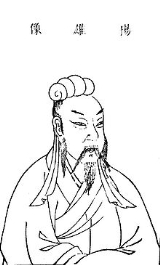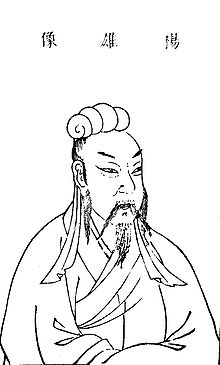
Yang Hsiung
Encyclopedia
 |
|
| Names Chinese name Personal names in Chinese culture follow a number of conventions different from those of personal names in Western cultures. Most noticeably, a Chinese name is written with the family name first and the given name next, therefore "John-Paul Smith" as a Chinese name would be "Smith John-Paul"... |
|
|---|---|
| Simplified Chinese: | 扬雄 |
| Traditional Chinese: | 揚雄 |
| Pinyin Pinyin Pinyin is the official system to transcribe Chinese characters into the Roman alphabet in China, Malaysia, Singapore and Taiwan. It is also often used to teach Mandarin Chinese and spell Chinese names in foreign publications and used as an input method to enter Chinese characters into... : |
Yáng Xióng |
| Wade-Giles Wade-Giles Wade–Giles , sometimes abbreviated Wade, is a romanization system for the Mandarin Chinese language. It developed from a system produced by Thomas Wade during the mid-19th century , and was given completed form with Herbert Giles' Chinese–English dictionary of 1892.Wade–Giles was the most... : |
Yang Hsiung |
| Zi Chinese style name A Chinese style name, sometimes also known as a courtesy name , is a given name to be used later in life. After 20 years of age, the zì is assigned in place of one's given name as a symbol of adulthood and respect... : |
Ziyun (子雲) |
Yang Xiong (53 BCE–18) was a Chinese
China
Chinese civilization may refer to:* China for more general discussion of the country.* Chinese culture* Greater China, the transnational community of ethnic Chinese.* History of China* Sinosphere, the area historically affected by Chinese culture...
Daoist, poet
Poet
A poet is a person who writes poetry. A poet's work can be literal, meaning that his work is derived from a specific event, or metaphorical, meaning that his work can take on many meanings and forms. Poets have existed since antiquity, in nearly all languages, and have produced works that vary...
, and author
Author
An author is broadly defined as "the person who originates or gives existence to anything" and that authorship determines responsibility for what is created. Narrowly defined, an author is the originator of any written work.-Legal significance:...
from modern Chengdu, Sichuan
Chengdu
Chengdu , formerly transliterated Chengtu, is the capital of Sichuan province in Southwest China. It holds sub-provincial administrative status...
. His name written in Chinese is 揚雄, but it is frequently mistaken as 楊雄 in historical documents, for example the Sancai Tuhui
Sancai Tuhui
The Sancai Tuhui, compiled by Shanghai natives Wang Qi and Wang Siyi , is a Chinese encyclopedia known at the time as a type of Book by category , completed in 1607 and published in 1609 during the Ming dynasty, featuring illustrations of subjects in the three worlds of heaven, earth, and...
.
Yang is considered a materialist. He did not believe human nature was inherently good as Mencius
Mencius
Mencius was a Chinese philosopher who was arguably the most famous Confucian after Confucius himself.-Life:Mencius, also known by his birth name Meng Ke or Ko, was born in the State of Zou, now forming the territory of the county-level city of Zoucheng , Shandong province, only thirty kilometres ...
(fl. 4th century BCE) had written, nor inherently bad as Xunzi (c. 300–230 BCE) had written, but came into existence as a mixture of both. His works include the divinatory Taixuan (太玄, "Great Mystery"), the Fayan (法言, "Words to Live By") anthology, and the first dialect dictionary Fangyan
Fangyan
The Fāngyán , edited by Yang Xiong, was the first Chinese dictionary of dialectal terms. The full title is Yóuxuān shǐzhĕ juédài yǔ shì biéguó fāngyán "Local speeches of other countries in times immemorial explained by the Light-Carriage Messenger," which alludes to a Zhou Dynasty tradition of...
. He was a close associate of the official and philosopher Huan Tan
Huan Tan
Huan Tan 桓譚 was a Chinese philosopher of the Han Dynasty and short-lived interregnum of the Xin Dynasty . Huan's mode of philosophical thought belonged to an Old Text realist tradition supported by other contemporaries such as the naturalist and mechanistic philosopher Wang Chong Huan Tan 桓譚 (c....
(d. 28 CE), an Old Texts
Old Texts
In Chinese philology, the Old Texts refer to some versions of the Five Classics discovered during the Han Dynasty, written in archaic characters and supposedly produced before the burning of the books, as opposed to the Modern Texts or New Texts in the new orthography.The last half of the 2nd...
realist who may have heavily influenced the works of Wang Chong
Wang Chong
Wang Chong , courtesy name Zhongren , was a Chinese philosopher active during the Han Dynasty. He developed a rational, secular, naturalistic and mechanistic account of the world and of human beings and gave a materialistic explanation of the origin of the universe. His main work was the Lùnhéng...
(27–c. 100 CE). Yang is also known for his protest against the verbosity of the fu
Fu (poetry)
Fu is a kind of rhymed prose, or poetry style essay, popular in ancient China, especially during the Han Dynasty. The term fu is often used in a multiway contrast with the more purely poetic shi style, with the fixed-rhythm forms of poetry , and with various more explicitly prosaic forms of...
. He was hailed by Huan Tan as the "Confucius from the western parts".

Yang Xiong in Popular Culture
Yang appears as a character in the 2011 historical fantasy novel, The Ghosts of Watt O'Hugh.External links
- Full text of Yang Xiong's Fa Yan (English and Chinese) - Chinese Text ProjectChinese Text ProjectThe Chinese Text Project is a digital library project that assembles collections of early Chinese texts. The name of the project in Chinese literally means "The Digitization Project of Chinese Philosophy Books", showing its focus on books related to Chinese philosophy...
- Yang Xiong, Internet Encyclopedia of Philosophy biography
- Yang Xiong, Qin Shi Bu (琴史補; "Appended History of the GuqinGuqinThe guqin is the modern name for a plucked seven-string Chinese musical instrument of the zither family...
") article

